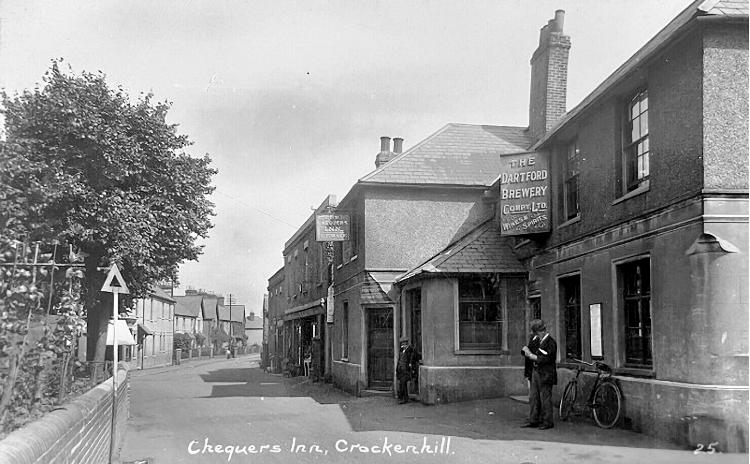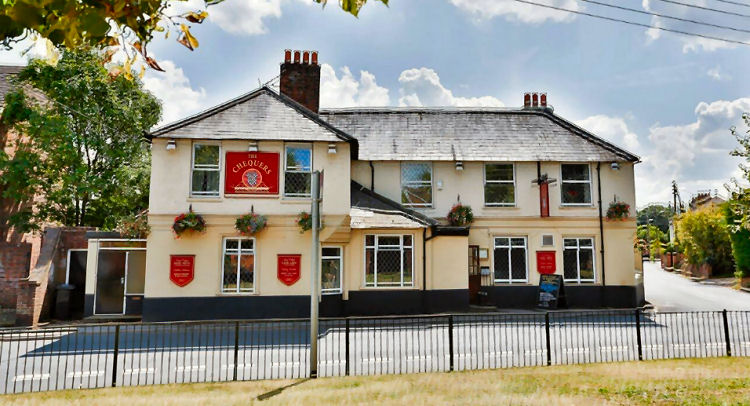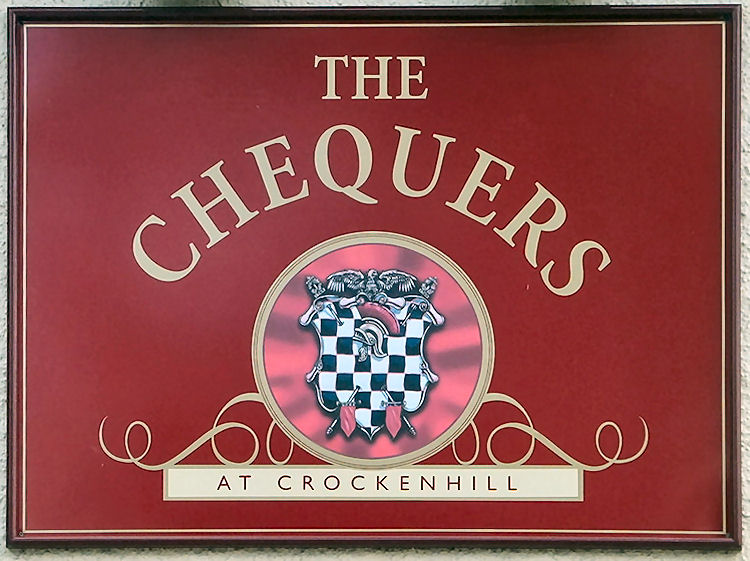|
St Mary Cray Road
Crockenhill
01322 662132
https://chequerscrockenhill.co.uk/
https://whatpub.com/chequers

Above postcard, date unknown, kindly sent by Michael Mirams. |

Above photo 2018. |

Above sign 2018. |
Crokenhill in 1707 was described as a hamlet in the parish of Eynsford.
|
South Eastern Gazette, 17 July, 1860.
EYNSFORD. The late Fatal Case.
Verdict of Wilful Murder against the Prisoner.
On Friday last an adjourned inquest was held at the "Chequers"
public-house at Crocken-hill, an outlying district of this parish,
before J. C. Carttar, Esq., coroner, to inquire into the
circumstances attending the death of Cordelia Covill, which occurred
on the previous Friday, the 6th inst.; resulting, as was alleged,
from a brutal assault committed on her by a man named John Grainger,
who, as stated in our last, was apprehended immediately after her
death, and was remanded by the magistrates at Dartford to Maidstone
on the charge.
From the circumstances attending the case, it excited a great deal
of attention in the neighbourhood, but the evidence was not of a
lengthy nature, the principal witnesses being a girl about thirteen
years of age, the daughter of the deceased woman, who was with them
all the time, and the surgeon who was sent to her by the prisoner.
It appears that the deceased had cohabited with Grainger, who tramps
about the country attending the fairs, &c., for the last thirteen
years, and previously to her death she left him. He went in search
of her, and found her on Wednesday at Bexley-heatb, in company with
Edward Colvill, her brother-in-law, in the road. He saw Colvill kiss
her, and heard her say, "God bless you" to him; and he (Grainger)
then went up to her, and knocked her down. She got up and asked
Grainger to forgive her for what she had done, but he said that he
would not. They then went together to a public-house, and he gave
her a pint of beer, having a bottle of ginger-beer himself. They
then went on further to another public-house, and had some more
refreshment, and applied for lodgings for the night, but were unable
to obtain them. They then went into a hay-field, deceased’s daughter
being with them, and lay there all night. In the morning (Thursday)
Grainger told her if she would tell the truth he would forgive her,
and she said she had done so. He then struck her, and kicked her
several times. After that they went to a public-house at Footscray,
and had some refreshment, and from there they proceeded to the
"Bull" public-house at Birchwood, where they had two pots of beer
and a quartern of gin. They had words there, and Grainger again
struck her. They afterwards proceeded towards Crocken-hill, and she
again asked him to forgive her, and he said he would. After lying
down in a wood to sleep for about two hours, they went to Crocken-hill,
lighted a fire by the roadside, and lay down. The deceased, after a
time got up, and drank some tea, and she afterwards requested
Grainger to make her a drop of broth; but not being able to do so,
he got some flour and a piece of butter and mixed them together and
boiled them. Before it was ready, however, the deceased had a fit,
and as he could not recover her he sent the girl for
three-pennyworth of brandy. Rum was brought in mistake, and he gave
it to her. He afterwards sent for a similar quantity of brandy three
different times, which he gave to her. They were at the side of the
road all the time. Finding that she did not recover, he took her in
his arms, and carried her to a lodge a short distance from where
they were, and made her a bed on some straw; and after undressing
her as well as he could under the circumstances, he laid her down
and lay down beside her. After they had been sleeping some time, the
deceased got up, but immediately afterwards lay down again. In the
morning, when Grainger awoke, he found his companion considerably
worse, and he sent for more brandy for her, and got some vinegar to
bathe her head; but she was then nearly if not quite dead. Grainger
then went to Dr. Ashurst, at Famingham, and told him that he had
killed a woman at Crocken-hill, and he must go to her.
He gave Dr. Ashurst money to pay for the journey, and said that he
would go to the police and give himself up, and he was prepared to
be hanged for it. Dr. Ashurst immediately went to the place
described to him, and found the woman quite dead.
On Tuesday, four days after death, by the order of the coroner, Dr.
Ashurst made a post mortem examination, and found the organs, with a
slight exception, perfectly healthy. There were two marks in her
neck, and death resulting from compression of the brain, caused by
pressure on the principal vessels of the neck. He had no doubt that
those marks were caused by fingers pressing on the neck.
The jury, after consultation, returned a verdict of "Wilful murder"
against Grainger.
The prisoner, it seems, shortly after leaving Dr. Ashurst’s, was
apprehended by Fowle, 65, K.C.C., in a public-house at Farningham,
and at once admitted that he had killed the woman, and said he was
prepared to suffer for it; and after a strong caution that whatever
he said might be used in evidence against him, he made a voluntary
statement to Supt. Brandon, of Dartford, which agreed in great
measure with the evidence given above. He was taken before the
magistrates at Dartford on the following day, and was remanded as
before stated.
On Saturday morning last Supt. Brandon sent down Sergeant Dashwood
and a constable to bring the prisoner from Maidstone for final
examination, but the officers were informed by the gaoler that the
prisoner could not be removed, as he had received a warrant from the
coroner for his detention, the investigation having resulted in a
charge of wilful murder against him. Mr. Brandon explained these
facts to the magistrates, and the clerk was directed to communicate
with the Secretary of State, for an order for the prisoner to be
produced before them. Should the order be granted, the examination
on the capital charge will be taken on Saturday next.
|
|
South Eastern Gazette, 31 July, 1860.
Manslaughter at Eynsford.
John Grainger, aged 35, a travelling hawker, was charged with the
manslaughter of Cordelia Covill, a woman with whom he cohabited, at
Crocken-hill, in the parish of Eynsford, on the 5th July; the grand
jury having ignored the bill on the coroner’s inquisition for
"Wilful murder," Mr. Deedes appeared for the prosecution, and Mr.
Ribton defended the prisoner.
Henry Covill, a labourer at Lewisham, said:— The deceased was my
mother. I saw her dead at the "Chequers" public-house, Crocken-hill,
two days after her death. I had seen her alive the previous Sunday,
at Greenwich. On the following morning the prisoner came to me in a
brickfield where I was at work. He asked me where my mother was, but
I could not tell him. He said "It is no use telling me that lie, as
I know you have seen her." I said, "If you will go home until
dinner-time I will see." He came to me at dinner-time, and said that
if I would tell him where she was he would give me a sovereign, or
anything I wanted. I told him I could not tell him — that I last saw
her at Greenwich, at my cousin’s. We went together to Greenwich, and
after I enquired there about my mother I told the prisoner that she
had gone towards Crocken-hill. We then went together to Black-heath,
and the prisoner said if he could see my mother lying dead at his
feet he should be a happy man.
Maria Covill, a girl about 12 years of age, daughter of the
deceased, said:— The prisoner Grainger and my mother had lived
together for some time, and I was with them. They travelled about
the country, and sold earthenware. I remember my mother’s death. We
got to Crocken-hill over night, and slept in the open shed all
night. My mother died next morning. While in the shed my mother said
she thought she could feel her brains turn. After that the prisoner
sent me for three pennyworth of brandy, and my mother took it. The
prisoner left, saying he was going after the doctor. A day or two
before my mother’s death we were all at Bexley-heath. When the
prisoner first came up to say mother he knocked her down; that was
two days before she died. My mother then got up, and after going on
some distance she sat down by the side of the road, and the prisoner
struck and kicked her when she was down. We then went on together
again, and that night we all three slept together in a hay field.
The next morning the prisoner hit and kicked my mother again when
she was standing up. She asked him not to do it any more. After that
he hit her again, and she fell to the bank at the road-side. There
was quarrelling between them, but I did not hear what it was about.
We went on to Birchwood corner, and from thence to Crocken-hill.
After we left Birchwood my mother said that she felt pains in her
head, and in her back.
By Mr. Ribton:— I never know my mother to have fits, and never
before heard her complain of pains in her head.
William Everist said that he went to a shed in his occupation at
Crocken-hill, Eynsford, on Friday morning, and found the deceased
lying there dead. He examined the body, and saw bruises upon it.
Thomas Style Fowle, 65, K.C.C., said:— I found the prisoner at the
"Chequers" public-house, Farningham, on Friday, the 6th July, and
apprehended him on a charge of causing the death of his wife. He
said " I know I have done it, and I hope to be hanged for it." He
then said he wished to make a statement as to how it was done, but
both Sergeant Dashwood and myself cautioned him. He, however, said
that on Saturday, the 30th June, when they were at Croydon, the
deceased left him, taking with her nearly £10 of his money; he went
in search of her, and found her near Bexley-heath, in company with
another man. They went into the "Bull" public-house, at Birchwood,
and he struck her and kicked her. They then went on to Crocken-hill
where they went into a lodge, and she got much worse, and he did not
know what to do with her. He said that she asked him to forgive her,
and he said that he would not at the first, but afterwards said that
he would if she spoke the truth. He then sent for brandy, and
finding that she got worse, he went to Farningham for the doctor.
Supt. Brandon, of the Dartford division, K.C.C., said that on
Saturday, the 7th July, he saw the prisoner in the lock-up at
Dartford. The prisoner wished to make a statement, and he cautioned
him against doing so. He, however, persisted, and the statement was
taken down in writing, (This statement, which we gave a short time
ago, and which was in accordance with the evidence already given,
was then read).
Dr. William Robert Ashurst, of Farningham, said that on Friday, the
6th July, the prisoner came to his house about half-past ten, and he
said "I want you to go up the road to see a person I have killed."
He also said that after he (witness) went to Crocken-hill to see the
deceased, he should give himself up to the police. He paid five
shillings for witness to go up. Witness sent his assistant, and on
the following Tuesday made a post mortem examination, by order of
the coroner. There were several marks externally, evidently bruises,
both on the thighs and arms. On the right shoulder there was also a
mark, caused by some blunt instrument. The marks had been caused by
blows or kicks, but those on the arms appeared as if the deceased
had been held by some one. The marks were not such as would cause
death. There were marks about the neck, just under the jaw, on each
side, as if caused by pressure, and they appeared as if recently
made. On removing the skull the membranes differed from what they
are in their natural state, and there was a quantity of clotted
blood under the membranes. His opinion was that the blood was caused
by pressure on the principal vessels. Blows or falls might have
caused that compression of the brain. The state of the brain was in
his opinion the cause of death.
By Mr. Ribton:— The brain itself was in a healthy condition, but
judging from the appearance of it he should not think that the
deceased bad been subject to fits. The extravasations of blood was
caused by a rupture of the vessels. If the woman was naturally weak,
and she had drunk several glasses of brandy and beer, the rupture of
the vessels might have taken place naturally.
By the Court:— When he made the examination the body was partly
decomposed. He could not tell so well at that time the state of the
vessels as if his examination had been more recent. There were no
marks of violence on the outside of the head.
Mr. Ribton having addressed the jury, his Lordship summed up very
minutely, and the jury, after a brief consultation, returned a
verdict of "Guilty."
The prisoner was sentenced to three years’ penal servitude.
|
LICENSEE LIST
LEAVER/LEUR John 1707-33 dec'd
BLAGDEN John 1841-47+ (age 45 in 1841 ) )

BOOKER John 1851+ (widower age 67 in 1851 ) )
BOOKER John O 1861+ (age 34 in 1861 ) )
WALTER Jane A 1871+ (age 36 in 1871+ ) )
MARTIN George C 1881+ (age 52 in 1881 ) )
MILLS William H 1891-1901+ (age 58 in 1901 ) )
MILLS Frank 1903-11+ (age 44 in 1911 ) )

https://pubwiki.co.uk/Chequers.shtml
 Census Census
 From Bagshaw Directory 1847 From Bagshaw Directory 1847
 From the Kelly's Directory 1903 From the Kelly's Directory 1903
|


